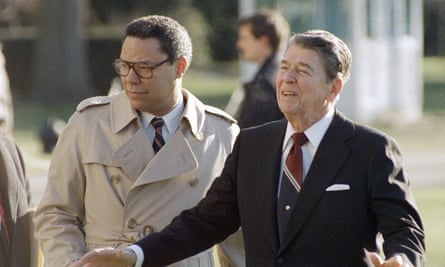Perhaps the most revealing analogy for blackness can be found in the first section of the standard obituary. Most of these life synopses follow a straightforward template, with the first paragraph spelling out the bare facts. This person was born. This person was alive for this number of years. This person is no longer alive.
The second paragraph usually summarizes the person’s most notable accomplishments, good or bad. Ronald Reagan ended the cold war in the second stanza of his postmortem poem. Fox News founder Roger Ailes’s obituary notes that he turned the American presidency into the television show that eventually produced Donald Trump. But before former secretary of state Colin Powell’s obituary notes that he left office as “one of America’s least successful diplomats”, one fragment of one sentence explains why the four-star general was so well regarded by many, in life and death. Buried in the first paragraph is the reason a man who played an integral part in perpetuating the lie that led to a catastrophic war is lauded by Black progressives like Hakeem Jeffries and Karen Bass, who opposed the things Powell actually did.
“Colin Powell, who has died aged 84 from complications of Covid-19, rose higher in public office than any previous black American.”
To be Black in America is a complex, subtractive thing less defined by who a person is than who they are not. Colin Powell was not just a four-star general. He was not just the fourth in line for America’s highest political office. He was not just a diplomat or a soldier, or even a human being who lived and did things and died. Before he was any of those things, as noted by some of the most prominent news organizations on the planet in the first paragraph of his obituary, Powell was a Black man in America.
That Powell is considered an honorable man worthy of respect in death while epitomizing the abhorrent actions of an abominable administration is not hard to understand. He is a war-mongering nationalist who is also a symbol of American valor. For Black people in America, the two seemingly contradictory characterizations are not mutually exclusive. He is both and neither.
Being an American of African descent engenders a mutual sense of knowing among those whose existences are defined by the first paragraphs of their lives. We are not necessarily willing to absolve a person for their past sins simply because we share the same skin color. Still, we can appreciate what it means to navigate a system built with the intentions of erasing those of us who share the same ancestral heritage. Perhaps this collective benefit-of-the-doubt that non-white people graciously extend each other is the only privilege that blackness affords. It’s not that we forgive or forget; we simply understand.
WEB Du Bois, one of the greatest thinkers in American history, refers to this communal tendency as the “double-consciousness” – the result of existing both as an American and a Black person, which are two separate things. In some sense, Powell’s entire life can be viewed as the manifestation of this peculiar phenomenon described by Du Bois as “two souls, two thoughts, two unreconciled strivings; two warring ideals in one dark body, whose dogged strength alone keeps it from being torn asunder.”
Powell was born to working-class Jamaican immigrants and used the American military to forge a path toward full citizenship rights that were not available to most Black Americans when he began his career in the armed forces. Long before he was the face of the George W Bush administration’s effort that used false evidence to promote the Iraq war, Powell was charged with investigating the My Lai massacre, when American forces marched into the Vietnamese village of Son My and brutally slaughtered between 347 and 504 civilians in a four-hour period on 16 March 1968. Powell falsely concluded that the “relations between America soldiers and the Vietnamese people are excellent”. A year later, a military panel later determined that the division’s leadership destroyed evidence to cover up their comrades’ involvement in the massacre. Although Powell was never specifically implicated, the journalist David Corn notes that Powell was “part of an institution (and a division) that tried hard to keep the story of My Lai hidden”.

This is what it means to be a cog in the American machine. Whether it is Powell leading a division of the mightiest killing force on the planet or Barack Obama serving as commander-in-chief of a nation whose flying killer robots rain death and destruction on Afghan weddings, rising to any level of prominence or power means becoming “part of an institution” that tries hard to hide its already bloodstained hands. And, if you are Black, the journey from relative obscurity to importance is also a remarkable achievement, worthy of praise.
For anyone whose last name is not Bush, Powell’s rise from a mediocre, C-average student to the nation’s highest-ranking military officer and top diplomat is an impressive accomplishment. For a Black first-generation American, it is the equivalent of hitting the lottery while being struck by lightning … twice. Succeeding in any system specifically designed to limit Black advancement requires a certain level of self-sacrifice and silence that is almost impossible to explain. Imagine what it’s like to bite off a tiny sliver of your own tongue. Now imagine what it’s like to bite off a chunk every day.
OK, maybe it’s not that impossible to explain.
This mouth-numbing reality is a common story for many African Americans who achieved any measure of success. The collective Black respect enjoyed by the general also served as a shield that has protected Powell from criticism his entire career. It’s hard for anyone – even the Congressional Black Caucus – to criticize one of the most popular political figures in the country. Yet the misunderstanding of this dichotomy also encouraged the conservative delusion that Powell’s blackness alone made him a viable Republican candidate.
Powell’s political ideology was never the thing that endeared him to Black people. For example, as the 1992 presidential season approached, Republicans considered replacing then vice-president Dan Quayle with Powell. The thought was quickly nixed when polling data showed that Powell’s high Black approval rating didn’t translate into African Americans switching political parties to vote for the Black guy. The same speculation emerged again before the 1996 election until the GOP realized that, as a political candidate, Powell was actually more popular among white voters. Black people liked and respected Powell, but we weren’t going to vote for him.
Unlike their white counterparts, most African Americans never agreed with Powell’s war strategy. Black voters overwhelmingly disapproved of the Iraq invasion before and during the war, while most white voters initially supported it. Yet, in 2004, when nearly three-quarters of Americans said they were worried about Iraq, Powell’s approval never waned. In 2008, his approval rating was 20 points higher than Kanye West or Tiger Woods. But it wasn’t Powell the politician, Secretary Powell or General Powell who garnered all that support in the Black community. It was the Black guy from the South Bronx who married a Black woman, endorsed the first Black president, and repudiated the most recent anti-Black president who was considered a respected figure worthy of honor.
And none of that admiration was in spite of Powell’s complicity in the corrupt Bush administration. For the most part, Powell’s admirers still condemned the policies of the nation-building neo-conservative cabal in which he served and supported. But Black folk also know that in the entire history of the US, there has never been a Black man – not even Barack Obama – who had the unilateral authority to start an international conflict. Because they are Black, they know scapegoating Colin Powell as the cause of America’s geopolitical failures is as laughable as blaming global warming on Megan Thee Stallion for pushing her “hot girl summer”.
To be clear, Powell is not blameless for the casualties, atrocities and oppression that took place under his leadership. He chose to become part of the American machine and he deliberately worked his way toward the steering wheel. He deserves every negative syllable in his second paragraph. In a country where the entire existence of Black imagination lies somewhere between a chalk outline and a remarkably articulate tongue-snippet swallower, Colin Powell is simultaneously a GOAT and a goat. He is both. He is neither.
The oxymoron of what it means to be Black in America can be summed up in those two fragments of those two paragraphs.
Colin Powell was “one of America’s least successful diplomats”.
Colin Powell also “rose higher in public office than any previous black American”.
And somewhere between that sobering nadir and that spectacularly improbable zenith lies every Black man or woman who ever lived and breathed.
